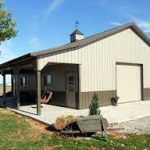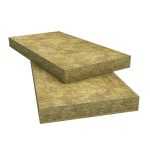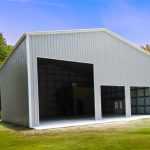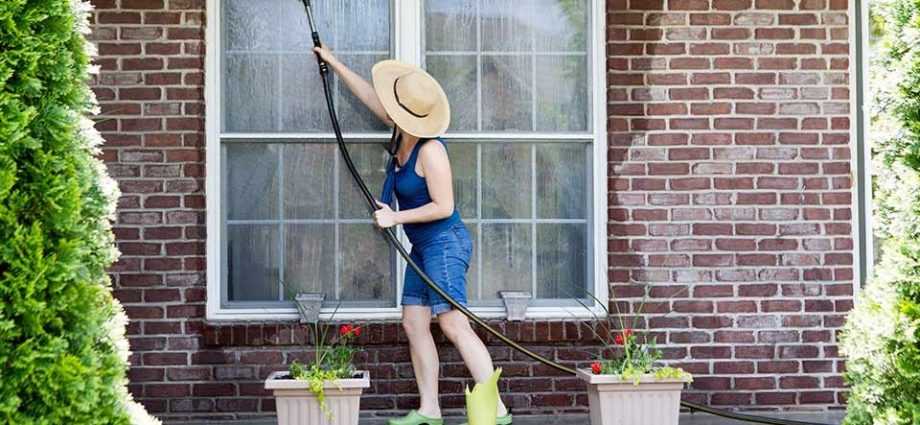Summer is a great opportunity to make sure your home and surroundings are ready to be enjoyed. When it comes to summer and preparing your home and garden, we’ve put together a few key things you should do to make sure your home is summer-ready. It’s easy to forget about your home care when the winter months are upon us. However, now is the perfect time to consider how you can prepare your home for the summer ahead. Here are our top tips for preparing your home for the summer months.
Clean gutters and drains
Cleaning the gutters and drains is often the last item on most people’s to-do lists, but it’s an important task before getting into summer. Debris such as leaves and mud can clog the drains and once it piles up, it can lead to leaks into the walls and roof. Clearing any possible build-up from your gutters goes a long way in lowering the risks of water damage.
Guide water away from your property
Even if your channels and sewers are clear, the remaining water from winter may enter the leader’s pipe, drain the edge of your house, and flow into your basement. It’s important to have a ditch and underground pipes installed to get roof water from your property. You also have to make sure all the sloping landscapes are from your property.
Get your central heating system checked
The central heating system that was damaged during the winter could be very terrible for several years. So be sure to fix it during the summer so that the same experience doesn’t repeat. Make sure your central heating is served by certified engineers before the cold weather is located.
Routine maintenance can expand your furnace life, help avoid carbon monoxide leakage, and improve the efficiency of your unit. This will be embarrassing if the very cold temperature is destroyed, which should be a comfortable time. So make this priority before Jack Frost returns.
Install insulation
The Energy Saving Trust reports that you can enjoy significant savings every year with your power bill by having quality isolation governed by a professional. About a quarter of the heat in your house runs away through the roof, so he pays to have an attic or isolated attic. Having an isolated wall cavity also helps reduce utility costs. Check your gutter installation properly.
If you don’t have enough money to cover the installation costs of isolation, you can search for grants and programs offered by the government to fund these projects.
Clean the window and screen
Caulk has a gap in the framing and checks whether the mechanic works by opening and closing each window several times. Wash the window with vinegar-ammonia solutions first, then only with water. Dry with Squeegee.
Wash the window on a cloudy day
If not, the sun might dry the solution too fast, leave the lines. When you clean, evaluate how your Windows has had a winter. Look for dried rotten signs or water damage. Check the seal around Windows too, and re-caulk, repaint or change the damaged weatherstripping where it is needed. It will run far towards keeping the hot air out and the air is cold because the weather becomes warmer. Finally, clean your window screen, check them, fix the damage, and reinstall it on your windows. Use hoses and mild detergents, but don’t press them – the power of spray can damage it. You can repair a damaged screen with a kit that you can buy in most home improvements or hardware stores.
Check your roof
A fast view on the roof and the exterior of the house you can reveal a small problem that has started during the winter, which you can fix before it becomes a big problem. Shend shingles that are not aligned, cracked, or lost, all of which can let the water release T. Check the chimney and the joints between bricks or stones for the pieces that have fallen or have vegetation that grows in it. Both can be signs of water problems.
Safeguard against water damage
Along with heat comes rain, and sometimes, rainstorms can change dangerous and disaster.
Be sure to protect your home against floods and damage to storms by checking the foundation of your home. In particular, you will want to check your basement. Search for cracks or holes and seal accordingly. Make sure your sewers are cleaned and water runs away from your home, not for it. Finally, don’t forget to check your roof to check the herpes zoster, crack, and warping. If you suspect the roof needs repairs, it’s a good idea to call professionals and get offers about how much it costs to repair the damage before getting worse.
Increase ventilation
Another important way to prepare your home for summer is ensuring it is well ventilated. If you don’t have a way to calm yourself when the temperature rises, your house is getting hotter. One way is to change fans and let cool air into the house. Windows Replacement is a good idea for proper ventilation. AC maintenance will also be very important to you. You don’t want to be destroyed in the summer when the company AC is busier and costs more for service. Hire an AC repair technician when you can still so you can start summer all bend.
Plant shade outside your home.
A tree does not grow overnight, but with a little forethought, you may get wonderful results that will not only make the outside of your home appear nice, but will also keep it cooler. According to Common Sense Homesteading, a tree in full blossom can prevent more than 70% of solar radiation from entering your home. Find plants and trees that will thrive in your area and place them in front of windows that get afternoon sun.
Consider a dehumidifier
People and pets are far more uncomfortable in moist heat than in dry heat. Dehumidifiers remove moisture from your home’s balmy summer air, making it considerably more comfortable even at higher temperatures. Maintain an indoor humidity level of less than 60%. To save money on electricity, select a machine that switches off when the humidity falls below a preset level. Water your plants with the water collected by the humidifier.




















